Published in Nacional number 673, 2008-10-05
Russian Governorship on the Adriatic
Montenegro pulls ahead of Croatia
Thanks to Russian capital Montenegro is set next year to become the leading luxury tourism destination on the Adriatic
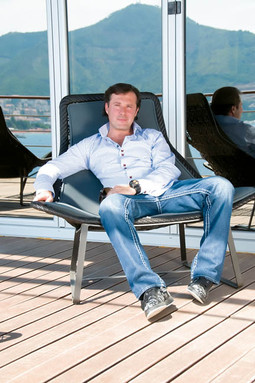 Vyacheslav Libman While in Croatia there is only talk, from year to year, about the need to increase foreign investment into the tourism industry, the development of elite tourism and the introduction of the well-known global hotel brands on the market is in fact happening in neighbouring Montenegro. Foreign investors, most from Russia, are literally building new towns, investing into luxury hotels and elite nautical tourism marinas. There has been so much construction in Montenegro over the past few years that come towns have become practically unrecognisable. Podgorica has changed so dramatically that anyone who has not visited over the past few years will be hard put to find their way around. Numerous modern buildings have been constructed, the building of the Technical College has been renovated, new embassies erected, the parks and streets cleaned up and the hotels revamped. And the seaboard is different. Passing from Debeli brijeg towards Budva one cannot but notice the many bilingual signs, in Russian and Montenegrin, advertising various companies. Budva looks like it is twice as big as it was a decade ago. Elite hotels have been erected along the seaside, the town promenade has been tidied up, as have the beaches and surrounding grounds. There are numerous construction sites whose signs declare, for the most part, Russian firms. And on the streets of Budva it is quite normal to hear someone speaking Russian, you can buy Russian newspapers issued in Montenegro at the newsstands, and Montenegrin TV broadcasts a part of its programming in Russian.
Vyacheslav Libman While in Croatia there is only talk, from year to year, about the need to increase foreign investment into the tourism industry, the development of elite tourism and the introduction of the well-known global hotel brands on the market is in fact happening in neighbouring Montenegro. Foreign investors, most from Russia, are literally building new towns, investing into luxury hotels and elite nautical tourism marinas. There has been so much construction in Montenegro over the past few years that come towns have become practically unrecognisable. Podgorica has changed so dramatically that anyone who has not visited over the past few years will be hard put to find their way around. Numerous modern buildings have been constructed, the building of the Technical College has been renovated, new embassies erected, the parks and streets cleaned up and the hotels revamped. And the seaboard is different. Passing from Debeli brijeg towards Budva one cannot but notice the many bilingual signs, in Russian and Montenegrin, advertising various companies. Budva looks like it is twice as big as it was a decade ago. Elite hotels have been erected along the seaside, the town promenade has been tidied up, as have the beaches and surrounding grounds. There are numerous construction sites whose signs declare, for the most part, Russian firms. And on the streets of Budva it is quite normal to hear someone speaking Russian, you can buy Russian newspapers issued in Montenegro at the newsstands, and Montenegrin TV broadcasts a part of its programming in Russian.
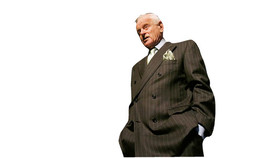 Peter Munk The Montenegrin seaboard is also the site of the implementation of what are probably the two largest investments in the Mediterranean – the Astra Montenegro residential settlement in the maritime town of Budva and the marina in Tivat in Boka kotorska Bay, where a small town named Porto Montenegro is to be built for some 7,000 new inhabitants. The entire Porto Montenegro project, whose worth is estimated at about 600 million euro, will include an 800-berth yacht marina, 150 of which will be for mega-yachts, a number of luxury residential buildings, two high-category hotels, one of which will be run by global hotel industry leader Four Seasons and public areas, galleries, squares and a nautical museum. It will all stretch over 65 hectares. The investor is the Adriatic Marinas company, whose majority owner is Peter Munk, a Canadian businessman of Jewish extraction, also the owner of the world's biggest mining company, Barrick Gold, whose primary operations centre on the mining of gold. His partners are the well-known British banker Lord Rothschild and his 37-year-old son Nathaniel and the wealthiest Frenchman on the Forbes list, millionaire Bernard Arnault, the president of the largest conglomerate of luxury brands, the LMVH company. A stake in the ownership is also held, which has only recently been made known to the public, by 40-year-old Russian billionaire Oleg Deripaska, the ninth wealthiest person in the world. The completion of the first phase of the Tivat marina is scheduled for June 2009. According to the spokesperson of the Adriatic Marinas company, Maja Vujaskovic, the first reconstructed pier at the Tivat marina was presented to the public on 9 September, and another part of the marina with 300 berths will be built by June of next year, as will a luxury hotel that will be run by Four Seasons and some 10,000 square metres of tourism, residential and commercial units with a nautical museum. "The complex has been conceived as an open-plan small coastal town, and will be designed in keeping with traditional Mediterranean elements. Its architecture will be reminiscent of Perast, a coastal town in Boka kotorska Bay packed with palaces and churches and in which everything is built of stone", says Maja Vujaskovic of Porto Montenegro.
Peter Munk The Montenegrin seaboard is also the site of the implementation of what are probably the two largest investments in the Mediterranean – the Astra Montenegro residential settlement in the maritime town of Budva and the marina in Tivat in Boka kotorska Bay, where a small town named Porto Montenegro is to be built for some 7,000 new inhabitants. The entire Porto Montenegro project, whose worth is estimated at about 600 million euro, will include an 800-berth yacht marina, 150 of which will be for mega-yachts, a number of luxury residential buildings, two high-category hotels, one of which will be run by global hotel industry leader Four Seasons and public areas, galleries, squares and a nautical museum. It will all stretch over 65 hectares. The investor is the Adriatic Marinas company, whose majority owner is Peter Munk, a Canadian businessman of Jewish extraction, also the owner of the world's biggest mining company, Barrick Gold, whose primary operations centre on the mining of gold. His partners are the well-known British banker Lord Rothschild and his 37-year-old son Nathaniel and the wealthiest Frenchman on the Forbes list, millionaire Bernard Arnault, the president of the largest conglomerate of luxury brands, the LMVH company. A stake in the ownership is also held, which has only recently been made known to the public, by 40-year-old Russian billionaire Oleg Deripaska, the ninth wealthiest person in the world. The completion of the first phase of the Tivat marina is scheduled for June 2009. According to the spokesperson of the Adriatic Marinas company, Maja Vujaskovic, the first reconstructed pier at the Tivat marina was presented to the public on 9 September, and another part of the marina with 300 berths will be built by June of next year, as will a luxury hotel that will be run by Four Seasons and some 10,000 square metres of tourism, residential and commercial units with a nautical museum. "The complex has been conceived as an open-plan small coastal town, and will be designed in keeping with traditional Mediterranean elements. Its architecture will be reminiscent of Perast, a coastal town in Boka kotorska Bay packed with palaces and churches and in which everything is built of stone", says Maja Vujaskovic of Porto Montenegro.
The second massive foreign investment in Montenegro is located on Cape Zavala in Budva. The investor is the Mirax Group company whose majority owner is Sergei Polonsky, an eccentric 35-year-old Russian billionaire from St. Petersburg. His wealth is estimated at 1.2 billion dollars, and became a global celebrity in 2004 when the Russian federal space agency turned down his bid to be a space flight candidate. Mirax is also the chief investor in the construction of the largest skyscraper in Europe – Moscow's Federation Building. The structure stands 506 metres high with 93 floors, with office space in the lower third, a Hyatt hotel in the middle and luxury apartments on top.
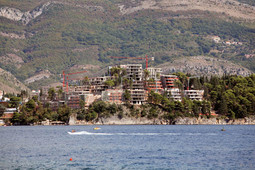 The construction site at Budva's Cape Zavala In Budva the Mirax Group is building the Astra Montenegro residential-hotel complex with two luxury hotels and 40 elite villas, stretching over 66 thousand square metres. It will feature 570 rooms and suites in two hotels, one of which will have 27 storeys, the other six, and both featuring a six-star standard. The larger hotel is architecturally reminiscent of the Burj Al Arab Hotel in Dubai, the only seven-star hotel in the world. The project is estimated at about 280 million euros, but Polonsky has said that he cares not what the cost will be and that he would invest as much as in needed. In October of this year Mirax is launching construction on the first of the two hotels, while most of the luxury villas will be constructed by May of next year.
The construction site at Budva's Cape Zavala In Budva the Mirax Group is building the Astra Montenegro residential-hotel complex with two luxury hotels and 40 elite villas, stretching over 66 thousand square metres. It will feature 570 rooms and suites in two hotels, one of which will have 27 storeys, the other six, and both featuring a six-star standard. The larger hotel is architecturally reminiscent of the Burj Al Arab Hotel in Dubai, the only seven-star hotel in the world. The project is estimated at about 280 million euros, but Polonsky has said that he cares not what the cost will be and that he would invest as much as in needed. In October of this year Mirax is launching construction on the first of the two hotels, while most of the luxury villas will be constructed by May of next year.
One of the co-owners of the Mirax company, Vyacheslav Libman, a Mirax director responsible for this part of Europe, moved from St. Petersburg to Budva almost a year ago, when the implementation of the Astra Montenegro project kicked off. The Zavala housing complex, he explains, will be of the closed type, and the people who purchase villas there will have all the necessary creature comforts. Electric-powered cars will be used within the housing complex to preserve the environment and to reduce detrimental influences to the living area. And, every owner will pay a monthly fee of 2 to 4 euros per square metre, based on the location of their villas, which will go towards maintenance. In return they will have practically nothing to worry about. The staff of the hotel company that will run the complex will see to it that their light bulbs are replaced, bills paid, breakdowns on the houses fixed and the like, and when not in their villas, the owners with be able to rent them out through the hotel management.
"What we are building at Zavala does not exist anywhere else in this part of Europe. We want Astra Montenegro to be the new symbol of Montenegro and this region, just as the Federation Building in Moscow has become a symbol of Moscow and Russia. The hotel company that will run the housing complex will be one of the world's best hotel companies – the Four Seasons, Sheraton or Hyatt. We have yet to sign a contract, but they are the ones we are considering", says Libman.
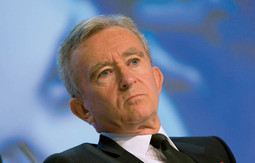 Bernard Arnault And while there is another eight months to the completion of construction on the first phase of the housing complex, Libman says that as many as 60 percent of the luxury villas at Zavala have already been sold. These are villas slated for completion by May of 2009. They have offers for the future too, so that as soon as phase one is complete, they will move forward. The new owners are for the most part Russians, but there are Serbs and Croatians. "The lowest price for the residential units we are building at Zavala is 8,000 euro per square metre. That price will not drop regardless of the global crisis and trends on the market, it can only go up. Mirax is building the kinds of property whose price, because of the high standard at which they are built, cannot be under 8,000 euro per square metre."
Bernard Arnault And while there is another eight months to the completion of construction on the first phase of the housing complex, Libman says that as many as 60 percent of the luxury villas at Zavala have already been sold. These are villas slated for completion by May of 2009. They have offers for the future too, so that as soon as phase one is complete, they will move forward. The new owners are for the most part Russians, but there are Serbs and Croatians. "The lowest price for the residential units we are building at Zavala is 8,000 euro per square metre. That price will not drop regardless of the global crisis and trends on the market, it can only go up. Mirax is building the kinds of property whose price, because of the high standard at which they are built, cannot be under 8,000 euro per square metre."Mirax, says Libman, is not even affected by the global economic crisis: "In September we sold more villas than in August. We did not cut the price per square metre of residential space because there is great demand for villas in Montenegro. We are selling units we have not even built yet. In Russia people trust Mirax. They have paid and know that they will get all that they have paid for because we have always met our obligations. People still want to buy, and the crisis is only in people's heads, caused by a lack of trust. That is why Mirax is not feeling the crisis. We plan to sell between 350 and 500 thousand square metres of newly constructed residential space over the coming five years. Those are the possibilities of the market, we have researched them, we know it is possible and we will see it through."
Libman says that the other markets in the region are not as interesting: "The market in the region is a limited one. Serbia and Croatia are interesting to us, but we do not want to build there for the moment. Croatia is interesting to us, but there are many elements that have to come together for Mirax to invest in Croatia. The greatest priority is the interest of Russian buyers. If it exists, Mirax will also consider construction. But there is not as much interest for buying as there is in Montenegro."
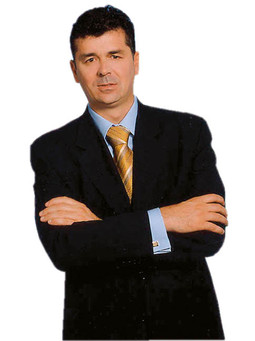 Branimir Gvozdenovic The reason is, Libman assumes, the massive promotion of Montenegro in Russia: "Russians who already have some property in Montenegro or live there promote it in Russia so that every year more wealthy Russians are coming to Montenegro. For example, we brought some 300 wealthy Russians to the Madonna concert, our potential buyers, many of which were in Montenegro for the first time. They liked everything very much, top-notch places, delightful buildings. It is near, just a three-hour flight from Moscow, we do not require visas, we have good relations with Montenegrins, and they accept us as their own. Besides that, even though it is of no consequence to me, but is to many, it is important that the Montenegrins are of the Orthodox faith, as are Russians. Polonsky recently gave an interesting description of why Budva was of interest to him. We were standing in the crowd ahead of the Madonna concert and he said – if there are bustling crowds in a town, that is a good place to live in – that means that there are people here, that there are buyers, there are events and there are tourists. There are Russians around the world, and we are looking for places were it is best for us – Dubai, France, Italy. Nevertheless, for many Russians it is Montenegro that is the ideal place to live in and to invest in, they feel it has great potential."
Branimir Gvozdenovic The reason is, Libman assumes, the massive promotion of Montenegro in Russia: "Russians who already have some property in Montenegro or live there promote it in Russia so that every year more wealthy Russians are coming to Montenegro. For example, we brought some 300 wealthy Russians to the Madonna concert, our potential buyers, many of which were in Montenegro for the first time. They liked everything very much, top-notch places, delightful buildings. It is near, just a three-hour flight from Moscow, we do not require visas, we have good relations with Montenegrins, and they accept us as their own. Besides that, even though it is of no consequence to me, but is to many, it is important that the Montenegrins are of the Orthodox faith, as are Russians. Polonsky recently gave an interesting description of why Budva was of interest to him. We were standing in the crowd ahead of the Madonna concert and he said – if there are bustling crowds in a town, that is a good place to live in – that means that there are people here, that there are buyers, there are events and there are tourists. There are Russians around the world, and we are looking for places were it is best for us – Dubai, France, Italy. Nevertheless, for many Russians it is Montenegro that is the ideal place to live in and to invest in, they feel it has great potential."
Besides building in Montenegro, the Mirax company is a sponsor of many events there. They sponsored the Madonna concert with a million euro, fronted half a million euro for a three-day festival at which Lenny Kravitz appeared, and sponsored a Class 1 motorboat race with 450,000 euro. Their total costs for the race was a million and a half euro as they brought in many Russian partners as guests. They have spent 600 thousand euro on parties in Budva, which is a total of about 5 million euro last year on various sponsorships. As far as investments go, says Libman, Mirax has no competition here, there is only one such large investor – Oleg Deripaska.
"We are the largest and most serious investor in Montenegro and have big plans. After Zavala we will build at another location, but I cannot announce it as we have no yet signed a deal. We will build a residential/tourist complex on 150 to 200 square meters. We do, however, have difficulties in finding a lot of that kind. And the price of land here is very high. That is a problem with the development of the property market in Montenegro, the price of land has been artificially hiked to a high level, but they cannot go on being this high. Land without a project is worthless, and costs a lot in Montenegro. But that will have to be adjusted."
That land in Montenegro is being sold at the maximum market prices is also the opinion of the Montenegrin minister for economic development, Branimir Gvozdenovic. They are, according to his information, the highest in the region. On the other hand, Gvozdenovic has denied the ever more frequent charges of the Montenegrin press that the country is being sold off a discount rates. Openness to foreign investors is Montenegro's national strategy, explains Gvozdenovic: "We use the capital earned from the sale of attractive locations targeted for construction in various development and capital projects, which has contributed to the dynamic economic growth that Montenegro has seen over the past few years. We had, for example, a high rate of GDP growth, which in 2006 stood at 18.4 percent, the following year at 18.2, and this year at 18.9 percent. The per capita GDP has grown from 2,400 to 4,000 euro. We have reduced the unemployment rate and increased the standard of living of the population."
Total investments in Montenegro in 2007 amounted to a billion euro, explains Gvozdenovic, which is 56 percent more than in 2006, and in the first six months of 2008 the amount of foreign investment came to 466 million euro. The openness of Montenegro to foreign capital is evident in all the construction presently going on there, by what has been built over the past years, but also by the investments that have been announced. Oleg Deripaska and Peter Munk are, for example, set to build golf courses on some 800,000 square metres of property near Tivat airport. Mirax is building new luxury units at Lucice beach in Petrovac, a commercial-tourist centre at the football stadium in Budva, and are completing the construction of a huge water-park called Water City on mount Toplis above Budva.
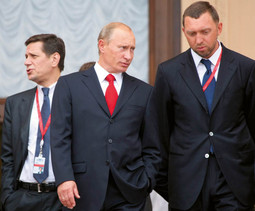 Russian moguls And while the state's statistics show otherwise, it is clear that most of the foreign investors in Montenegro are Russians. Budva is home to one of the most luxurious hotels on the Adriatic – the Splendid, where a part of the latest James Bond film, Casino Royal, was shot, is, according to the Montenegrin political weekly Monitor, in majority ownership of the Russian Viktor Valentinovic Ivanenko, the former director of the ruined Russian company Yukos and the former head of the Russian secret police. A 30,000 square metre lot on Lustica peninsula in Herceg Novi is owned by the Lustreca Company, behind which stands Moscow Mayor Jurij Luzkov, that is, his wife, Elena Baturina, the wealthiest woman in Russia. Russian oligarch Oleg Deripaska has, besides, become the majority stakeholder in the largest Montenegrin firm, the Podgorica-based Kombinat aluminija (KAP) aluminium producer and a bauxite mine in Niksic.
Russian moguls And while the state's statistics show otherwise, it is clear that most of the foreign investors in Montenegro are Russians. Budva is home to one of the most luxurious hotels on the Adriatic – the Splendid, where a part of the latest James Bond film, Casino Royal, was shot, is, according to the Montenegrin political weekly Monitor, in majority ownership of the Russian Viktor Valentinovic Ivanenko, the former director of the ruined Russian company Yukos and the former head of the Russian secret police. A 30,000 square metre lot on Lustica peninsula in Herceg Novi is owned by the Lustreca Company, behind which stands Moscow Mayor Jurij Luzkov, that is, his wife, Elena Baturina, the wealthiest woman in Russia. Russian oligarch Oleg Deripaska has, besides, become the majority stakeholder in the largest Montenegrin firm, the Podgorica-based Kombinat aluminija (KAP) aluminium producer and a bauxite mine in Niksic.
But Russians frequently invest by way of banks from many parts of the world, and the seats of their companies are often outside of Russia so that the impression is that their investments are less than their actual size. They sell the real estate they build for the most part to their compatriots. Which has to some extent changed the demographics of Montenegro. In a country that has somewhat over 600,000 inhabitants some estimates put the number of Russians living there at about 30,000. Most are in Budva, where this is evident in the bilingual signs put up by real estate agencies and some other firms. And, it is hard to get directions in Budva from a chance passer-by, because there is high probability that you will, in fact, come across a Russian. Budva's Stefan Mitrov Ljubisa Elementary School has 34 Russian pupils, and the Russians in Budva publish there own newspaper, the Russian Gazette and The Russian Adriatic, a lifestyle magazine. According to data in the press the Russians have bought 35,000 houses on the Montenegrin coast, and have some 350 real estate agencies. The village of Blizikuce, near the luxury vacation resort of Sveti Stefan, has been dubbed Russian Village by the Montenegrins as the Russians have bought up most of the land there and are building many houses.
All of this is not exactly sitting well with the Montenegrin public and short poems such as "Plovi patka, plovi guska, ova zemlja bit ce ruska" (The duck swims, the goose swims, this land will be Russian) can be found on various forums. The Montenegrin press have written on scandals in connection with the way in which these large foreign investors have come into the land on which they are building. The new Montenegrin town of Porto Montenegro and the marina are being built on land that once housed Tivat's Arsenal Naval Overhaul Institute. Munk purchased Arsenal for 3.2 million euro, which is about 76 million under its estimated value. Along with that 300,000 thousand square metres of land have been handed over to him around Arsenal, and he has received 139 hectares of the waters of Tivat Bay on a 90-year concession. In London's weekly The Economist, Munk referred to the entire deal as his new gold mine.
Of the Zavala project the press is saying that Mirax does not have the necessary construction permits, while Mirax claims that they lacked only a single permit, which has been issued in the meantime. Munk's partner in the construction of Porto Montenegro, Oleg Deripaska, purchased the largest Montenegrin company, Kombinat aluminija, and is now suing the Montenegrin government of wrongly presenting the situation in the company during the privatisation, and is seeking international arbitrage. In the opinion of Minister Branimir Gvozdenovic, and of most of the Montenegrin press, the demand for arbitrage is unfounded, and the privatisation carried out properly: "It is my impression that the launching of an arbitrage procedure is not motivated by the buyer's conviction that his demand is grounded, but rather by the desire to initiate an issue which he feels can strengthen his negotiating position towards the government and local partners."
The majority of foreign investors to Montenegro were brought there by Svetozar Marovic, the first president of Serbia & Montenegro, who hails from Budva, where he now lives. He was also one of the investors on Cape Zavala in Budva, but sold his stake a few months ago for a million euro. Besides the Russians he has also brought the royal family from Dubai to Montenegro, which will also build in the country. As one Montenegrin journalist, now an employee of the Mirax company, says: "Everything revolves around Marovic. As president he used diplomatic acquaintances, and friendships. He is a friend of Italian Prime Minister Silvio Berlusconi. If Budva needs something from Italy, he calls him directly and asks for it. He invites all the powerful figures he knows to come and see Montenegro. He brought the well-known Class 1 motorboat race to Budva, is responsible for the arrival of Madonna, the Rolling Stones, everything that has come to Montenegro. He is under the fire of criticism from many corners, but I think he is doing the right thing. He wants Budva to become a globally recognised tourist centre. He has made it possible for the wealthiest and best known Russians, from musicians to politicians, interested in buying real estate and in investing in Montenegro. Montenegrins are open to foreigners, especially towards Russians. There is even a well-known saying 'in Montenegro – we and the Russians number 300 million, and without the Russians half a truckload'. On the other hand there are people who feel that the Russians have bought them out. They are, nevertheless, entirely accepted in the places they have settled. They do not socialise only among themselves, but rather also with the Montenegrins, are quick to pick up the language and adapt."
It is not easy to provide a complete picture of the foreign investment into Montenegro as much of the investment comes by way of third countries or local firms. The European Union, concerned with the level of Russian investment into Montenegro, requested of its experts a credible study into the actual size of these investments. In the study, which looked into Russian investments in Montenegro, it reads "there are much more Russian investments than is indicated by official data, but certainly not as much as is often emphasised in the press, i.e. by public opinion." But Montenegro is also of geo-strategic interest to the Russians, not just in terms of its economic and tourist potential. As far back as the time of Imperial Russia there has been a plan of strategic Russian access to a warm sea. Montenegro could for Russia be just such an exit. An article was recently published in the US political weekly The Nation that says that Oleg Deripaska purchased the largest Montenegrin company, Kombinat aluminija, at Putin's encouragement. By taking over key Montenegrin firms, Deripaska, who is close to Putin, is getting an opportunity to influence the Montenegrin economy, and through it, in time, national policy. It should be no surprise if Russian naval vessels soon sail into Boka kotorska Bay.
Russians in Budva
A new town and marina
On the land of the former Arsenal Naval Overhaul Institute in Tivat, Canadian Peter Munk, Russian billionaire Oleg Deripaska, British banker Lord Rothschild and the wealthiest Frenchman Bernard Arnault will build an 800-berth yacht marina and a small coastal town for 7,000 inhabitants they have named Porto Montenegro. The value of the project is estimated at 600 million euro, and the completion of the first phase of the marina's construction is slated for June of 2009.
Related articles
Šeks and Vidošević hold secret dinner meeting
José Carreras, one of the world's best known tenors, performed in Zadar for a audience of three and a half thousand, but some did not come to Zadar… Više
Latest news
-
28.10.2010. / 14:15
'A profitable INA is in everyone's interest'
-
28.10.2010. / 09:38
Sanader’s eight fear SDP — Won’t bring down Government
-
21.10.2010. / 15:02
Interior Ministry turned a blind eye on Pukanic assassination
-
20.10.2010. / 09:34
Barisic could bankrupt HDZ




